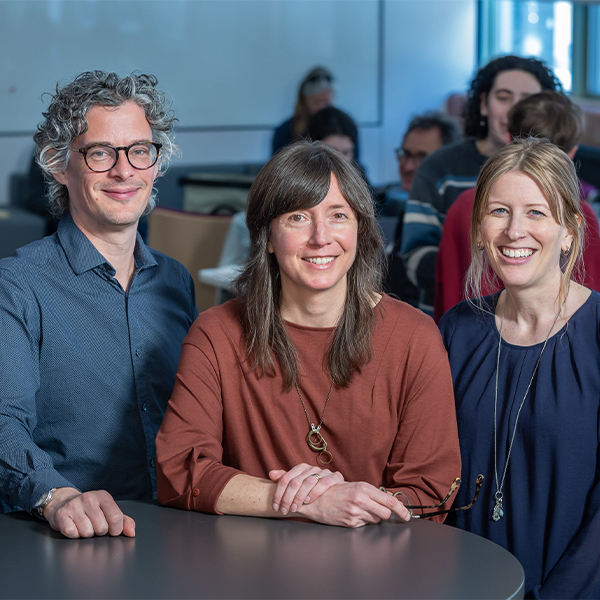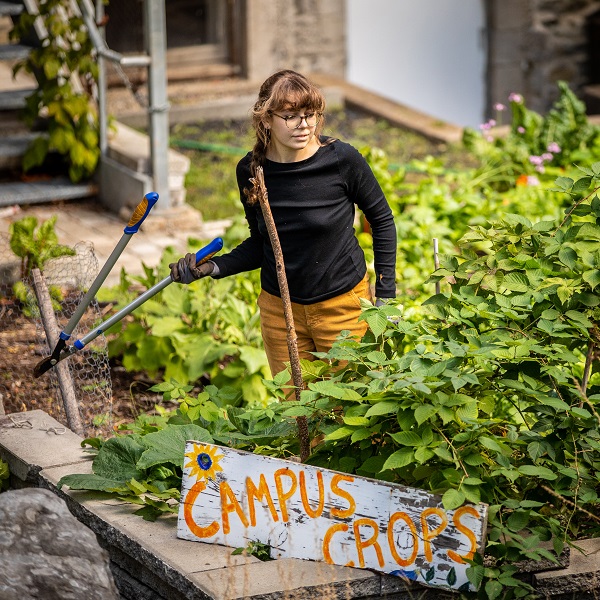It’s a welcome bit of good news amid the ongoing pandemic: McGill’s faculties of Arts, Engineering and Science will all go ahead with this summer’s undergraduate research projects.
All three faculties run programs that pair an undergraduate student with a McGill faculty member: Arts’ ARIA (Arts Undergraduate Research Internship Awards), Engineering’s SURE (Summer Undergraduate Research in Engineering), and Science’s SURA (Science Undergraduate Research Awards) and NSERC USRA (Natural Sciences and Engineering Research Council of Canada Undergraduate Student Research Awards). McGill’s Building 21, which encourages interdisciplinary research, will also maintain its BLUE Fellowships.
All research projects will be carried out remotely.
“I am very happy that the project can proceed by remote working,” says Science student William Xing. “I was looking forward to starting my project and I really cannot imagine how sad I would be if I lost this chance.” Xing received the Johanne and Kenneth Kaplan SURA and will work on a geography project with Professor Bernhard Lehner.
“This is often their first chance to be exposed to a real research project,” says Associate Dean of Science Dr. John Stix. “It’s such a great opportunity, and we felt that we had a moral obligation to the students in terms of trying to make it work.”
All the student research positions are paid; awards range from $3,000 for a two-month BLUE Fellowship to a minimum of $7,125 for 16 weeks of full-time work for Science’s NSERC USRA. Generous donors provide the majority of funding received by Arts, Engineering and Science students.
Uncharted territory
These programs wouldn’t have been possible this summer without the creativity and quick thinking of faculty staff and administrators. The same will be asked of faculty and students going forward.
Even those whose project tasks remain unchanged will be required to make adjustments. Students cannot meet in-person with their supervisors, work together in McGill labs or study spaces, nor take out physical books or journals from the library.
“Despite this, I am still optimistic that students can have a positive experience,” says PhD candidate Shayne Gracious, who will help supervise a Science student. “If students are able to maintain the necessary self-motivation, the lessons they learn in this process will be invaluable in their future endeavours.”
Arts
The Arts Research Internship Awards (ARIA) has arranged summer placements for nearly 380 undergraduate researchers since its founding in 2010. Another 34 will participate this summer.Despite campus closures, “I had a great reaction from administrators, faculty and students, who were eager to continue the internships,” says Arts’ internship manager Anne Turner, BA’81. “It was terrific to see.”
The ARIA is an academically rigorous program that gives participants a first-hand look at the entire research process. In addition to in-depth research tasks, students write grants, prepare research proposals, and give poster presentations. Subjects include the status of journalism in Canada and the ethics of AI.
Workshops, a core part of the program, will now be online. The library training session was filmed for YouTube, and the orientation session consisted of two Zoom calls in order to accommodate multiple time zones. The program has even adopted its own social media hashtag, #RemoteAriaResearch. “It’s a way for students to share their experience,” says Turner. “We want them to be proud that they are the first to do this.”
Engineering
With the SURE program now in its 12th year, “there was never a question of cancelling,” says Christin Blohm-Pape, student affairs advisor and administrator in the Faculty of Engineering. In total, 107 students will participate in 79 different projects.
Topics range from an architecture project on carbon-reducing breathing walls to chemical engineering research focused on protecting water resources and public health. By participating in these projects, students can “explore different paths, decide if research or graduate studies interest them, and advance in their careers. They’re still very much interested in working on these projects.
“Other elements of the program, such as an orientation event, workshops, and a poster presentation, will be offered remotely. We’re proud to be able to offer research positions to over 100 students,” says Blohm-Pape, “and we want to give them the opportunity to show their work.”
Science
The decision to maintain Science’s summer projects came straight from the top: “Dean Lennox felt really strongly about it, as there wouldn’t be summer jobs available to students,” says Victor Chisholm, BA’97, Science’s student affairs administrator.
For students, the program means graduate school references, conference and networking opportunities, and the chance to be published as a co-author. Meanwhile, “we get great work done,” says Chemistry Professor Christopher Barrett. “Undergrads play an essential role in the yearly life of lab research, and most function as well as junior Master’s students by the end of the summer.”
All Science research projects were altered in some way, but none were cancelled: 150 students will participate this summer. Their research will encompass a variety of the faculty’s units, from Atmospheric and Oceanic Sciences to Physiology.
“There was a lot of negotiating, but in the end the projects are going forward, the students are getting paid, and the students’ responses were overwhelmingly positive,” says Dr. Stix. “We’re quite thrilled by it.”
Building 21
For those who wish to pursue ideas that don’t fit into McGill’s conventional research domains, there’s Building 21. This will be its third year running BLUE (Beautiful Limitless Unconstrained Exploration) Fellowships, which have attracted students from nearly every faculty, including Law, Medicine and Music.
“We decided that we would go forward this summer no matter what,” says founder Ollivier Dyens, who is co-director alongside Dr. Anita Parmar, BSc’00. In fact, they decided to increase the number of fellowships due to the pandemic, giving priority to applicants with financial need.Fourteen students will work on 13 diverse projects: one will use virtual reality to investigate autism spectrum disorder (ASD) learning; another will use fractal math to rethink pixel-based photography.In the midst of the global pandemic, “I think Building 21 is needed more than ever,” says Dyens.”We need creative people and ideas to solve problems.”
Testimonial
“I would like to express my gratitude to the donors that made it possible for me to receive a McGill Alumni and Friends Science Undergraduate Research Award this past summer. Working with the McGill Cosmic Dawn Intensity Mapping Group has been a pivotal point in my career. It allowed me to experience what it is truly like to participate in developing new ideas and solving real life problems.Thank you to all the donors that have made this experience possible. You have contributed to my development as a physicist, as well as my conviction that this is what I want to do for the rest of my life.”
– Joelle-Marie Begin, Science student
2019 McGill Alumni and Friends SURA recipient


